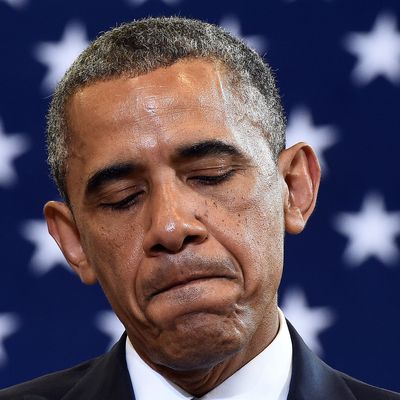
There are innumerable reasons to object to Donald Trump as a human being and prospective president of the United States. But yesterday, President Obama picked a strange one: that Trump is a phony populist. In a lengthy, more-than-900-word riff, Obama made the case for denying Trump the populist label. “Somebody else who has never shown any regard for workers, has never fought on behalf of social justice issues or making sure that poor kids are getting a decent shot at life or have health care — in fact, have worked against economic opportunity for workers and ordinary people, they don’t suddenly become a populist because they say something controversial in order to win votes,” he said.
Obama’s assumption is that populist means a politician who promotes economic and social opportunity. But that is not really what the term means. The ideological definition of populist means traditionalist on social issues and interventionist on economic policy — the opposite of libertarianism, in other words. They often appeal to their supporters on the basis of in-group solidarity, on either a national basis, an ethnic basis, or both. They may rail against the existing structure of the government, but they tend to favor bold regulatory interventions and generous social provisions.
Populism can also be defined as a certain kind of political style. Populists believe the government has been captured by evil and/or corrupt interests, and that it can be recaptured by a unified effort by the people (or, at least, their people). They express contempt for elites in business, government, and academia. Populists make their case in plain terms, and often argue that the problems themselves are simple, which explains why only corruption has prevented their easy resolution. Stylistic populism is not the same thing as substantive populism, though the two often go hand in hand. William Jennings Bryan is probably the Ur-populist in American history, most perfectly combining all the classic traits (the left-wing economic element on display in his Cross of Gold speech, the right-wing social element in his prosecutorial role in the Scopes Trial) but the tendency has appeared as well in figures like Huey Long, Charles Coughlin, and George Wallace. Whether any one of them is more easily categorized as right- or left-wing depends on the degree to which they emphasize the social or the economic element of their program. But roughly speaking, their promise is to put the government to work to fight for the people, and to defend traditional social values in some form.
Is Trump a populist? The substantive definition is difficult to measure, since Trump is so slippery about his positions. His embrace of conventional Republican positions on taxing the rich and regulating Wall Street is far from populist, though it’s telling that Trump pretends to favor taxing the rich at higher rates. He is more unrealistic than most Republicans about promising to maintain every dollar of social security and Medicare, and also in the lavishness of what he promises to replace Obamacare with. Trump is most identifiably populist on the issues he stresses most heavily: trade and immigration, where he positions himself straightforwardly (and accurately) as the enemy of the business and cultural elite.
In his political style, there is hardly any ambiguity: Trump is as populist as it gets. He treats essentially every figure opposed to him as hopelessly corrupt. Effective governance, in his telling, is simply a matter of wanting to help the people. Obama’s attempt to deny Trump the populist label, or to assert that a populist cannot also share Trump’s crude disparagement of outsiders (“That’s not the measure of populism. That’s nativism or xenophobia or worse”) is a misreading of the historical nature of populism.
Even less convincing is Obama’s attempt to define himself as a populist — a label I have never heard him claim before, and for good reason. Obama ticked off progressive elements of agenda — support for education, “a tax system that’s fair,” “curbs on the excesses of our financial sector” — and concluded, “I suppose that makes me a populist.” Well, no, not really. It makes him a liberal. Obama has not argued that the rich should be taxed at higher rates because they are morally culpable, nor that Wall Street controls the government or is defined by singular greed, and he has not proposed to attack them. Indeed, Obama has made precisely the opposite argument: that rich people in general and Wall Street in particular would be better served by supporting his policies, which are more sustainable if less profitable in the short term.
At one point in his riff about how he is a real populist, Obama wound up to this less-than-rousing crescendo:
[S]ometimes there are simple solutions out there, but I’ve been president for seven-and-a-half years, and it turns out that’s pretty rare. And the global economy is one of those areas where there aren’t a lot of simple solutions and there aren’t a lot of shortcuts to making sure that more people have opportunity in our countries. We are going to have to educate our kids better, and that takes time. We’ve got to make sure our manufacturing sector is more dynamic and competitive, and that takes time. We’ve got to restructure our tax codes to incentive the right things and make sure workers are getting higher pay, that takes time.
When you are arguing that there are no simple solutions, and that the non-simple solutions you favor will take a long time to work, you’re proving that you’re the opposite of a populist. The case that Obama should be making, or would be making if he were being true to the spirit of his career in public life, is that populism is not always correct. People need to be inspired, but without demonizing opposing elements in public life or offering simple solutions. The hallmark of Obama’s style has always been the promise that he could bring reason back into government, and that the policies he crafted would respect expertise. Obama is a socially cosmopolitan, intellectual technocrat, and a highly effective one. He can proudly defend that record. He’ll never out-populist Donald Trump.






























